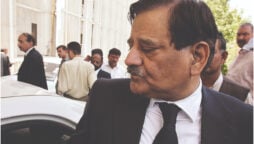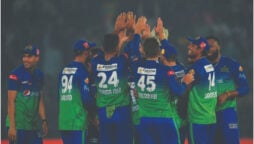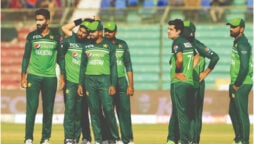
Out-of-the-box Memories
Let’s relive some of the forgettable moments of Pakistan vs. England Tests
The English team has won the hearts of the Pakistanis even before the first ball was bowled in the Pindi Test match. First their captain Ben Stokes announced he would donate all his match fees from the series to the flood relief fund.
Then when half the England team fell ill on the eve of the Test, they did not take the easy route of delaying the game by a day and bravely came out minus their first-choice wicketkeeper.
Lastly, the manner in which they overcame the placidity of the pitch and made a match of it with a bold declaration, winning at the death with the shadows lengthening ominously, has warmed the hearts of every Pakistani.
Yet no touring team to Pakistan has ever raised so many controversies, especially off the field, as England has whenever they have come here.
Call it a culture shock for the English players or condescension on part of some of them in the team or in visiting media toward the Pakistani players or people, is open to question.
Admittedly, it has lessened to an extent as facilities and infrastructure has improved across Pakistani cities since they first came to this independent country over 70 years ago.
But there still are reservations and apprehensions. For instance, at the start of the tour there came news that the tourists would be bringing their own chef on the tour as they were unhappy with the meals they were served when they were here to play the seven T20Is in September.
However, as former Pakistan captain Majid Khan once told me when English tourists complained on a tour many years ago of upset stomachs, blaming the drinking water they got here, that in effect they often suffered so because they overate the delicious Pakistani food.
“They love our curries and kebabs and there have been times when we tried to stop them, but they just found the food so delicious they had too much of it. Eventually, the spices did what they do but they would blame the water.”

That assertion by Majid some forty years ago was proven correct several years later when curry was found to be the fastest-growing dish in the UK in terms of popularity, especially among the white population.
To the extent that in 2001 British Foreign Secretary Robin Cook called chicken tikka masala “a true British national dish.” So much for fish and chips and Yorkshire pudding.
I just wonder then whether the chef that comes along with the tourists will actually be cooking more of tikkas and kebabs and curry than steaks and pie and salad. Ironically when half the travelling squad fell ill a day before the Test was to begin, they had had the last meal at the British High Commission.
So yes the English, whenever they have arrived in Pakistan have brought with them unusual demand or left behind a tour legacy, often both. It hasn’t been all awry. We owe in some part to them our acceptance into the ranks of Test playing nations.
The 1951-52 tour and that match at Karachi Gymkhana
I wrote about this match in detail last week but just to recap here for those who missed it. Pakistan was then a fledgling cricket country, just four years into playing cricket in the name of Pakistan.
We were green if I may be permitted the pun. The English cricket board sent a team in the name of MCC to play some matches here, hopping over to Pakistan in between a full Test series in India.
One of the matches they played was at Karachi Gymkhana that started almost 71 years ago to the day today, a four-day game in which the idea was floated that if Pakistan were to beat the England side they would be considered capable enough to compete against the best, and granted Test status.

It was a historic game where Fazal Mahmood bowled out the MCC for 123 on an opening day. Pakistan however were routed for 130. England with the help of a century from Tom Graveney set Pakistan a target of 285 which looked improbable considering their first innings effort.
However, the teenage Hanif Mohammad with help from MEZ Ghazali took Pakistan forward. Still, at 178-5, it seemed they would fall short until their skipper Abdul Hafeez Kardar and Anwar Hussain came together with a fine partnership that took them to within 24 runs when Anwar fell just short of fifty.
However, Kardar was not to be denied as he raised his fifty just as Pakistan crossed the target. Due to this victory over the Englishmen Pakistan was granted Test status and would play their first Test against India at Delhi less than a year later.
The 1955-56 tour and the bucket wash
On an unofficial tour to Pakistan, the MCC tourists were piqued at a couple of contentious decisions by the umpires. One of the umpires, Idrees Baig, especially got under the skin of the English players.

So it was that on one of the match evenings, some of the MCC players got together and decided that a message had to be passed. So some of them went to the hotel where the Pakistani umpires were housed.
There are two different versions of what happened next. One goes that they invited Idrees Baig back to their hotel for a meal and when he refused they ‘kidnapped’ him and brought them back to one of their hotel’s rooms. The other version goes that they just did the deed in his hotel room.
Either way, the deed was that they dumped a bucket of iced water over him. What happened after that also has two versions. One was that Idrees Baig laughed off the prank but was pushed to register a protest by Abdul Hafeez Kardar, the captain of the Pakistan side. The other one says that he was furious and needed no urging to protest to the MCC management.
Either way, the foreign office got involved as did the two national cricket boards. Apologies were forthcoming of course and averted a foreign relations mishap. The match and the tour continued.
Knott at Karachi
It was the third and final Test of the 1968-69 tour by the Englishmen. The first two Tests (which were for some reason 4-day matches; previously and after that also Pakistan played five-day Tests) had been drawn with honours shared; so it came to the third Test at the National Stadium, Karachi which was scheduled over five days. This could have been to get a result in the series. It was to prove a useless initiative as matters transpired.
Not just because of the benign nature of the pitches on which England, after winning the toss, batted first. But near the end of the first session and on the third day with England 502-7, the crowd stormed onto the ground.
In those days there was only a five-foot railing around the field. There was political unrest at the time and some said it was to bring it to the world’s attention.
Some said the crowd had become frustrated at England’s slow grind. Whatever the reason, one batter who ran for his life, Alan Knott the England wicketkeeper, was batting on 96 at the time.
He had batted for just over three hours, hitting one six and ten fours. With the match abandoned after that as shamianas were set on fire too, it was all he could go home with.
All 99s
It was the Karachi Test again when England came next to Pakistan in the spring of 1973. Once again the first two Tests were slow draws on dead pitches, and the one at National Stadium was no different.

And though there was some excitement in the final session on the fifth day as Pakistan’s middle-order collapsed and had to be rescued by a partnership between Wasim Bari and Sarfaraz Nawaz, for all the 15 sessions before that the batters dominated.
Yet there was no hundred in the match, not that no one came close. England’s skipper Tony Lewis was out for 88 but before that, there was a hat-trick of 99s.
First Pakistan’s captain Majid Khan was caught by Dennis Amiss at backward short leg for 99 and then Mushtaq Mohammad was run out also on 99 as he went for a difficult single.
Amazingly in England’s innings. Amiss who had caught out Majid was himself caught in the same position by Sarfaraz Nawaz also for 99. This thus became the first Test ever where three batsmen had been dismissed for 99.
Either Pakistan or Packer
The 1977-78 tour of Pakistan came in the same season when top international cricketers were playing for Kerry Packer’s breakaway series. Included in his troupe were five Pakistanis – skipper Mushtaq Mohammad, vice-captain Asif Iqbal, Majid Khan, Zaheer Abbas and Imran Khan.
Packer had agreed to release any players Pakistan chose for the Tests, but the Pakistani cricket board toed the line of the English board (who also had several players signing up with Packer and had banned them) and refused to consider the five.
By the time of the third Test in Karachi (needless to say again the first two Tests had been boring draws with Muddasar scoring the slowest ever Test century in Lahore), the late Omar Kureishi, then with PIA and a prominent commentator and columnist, took the initiative and after an agreement with captain Wasim Bari, called Packer to release Imran Khan for Pakistan to get some firepower into their bowling attack.
Packer in fact released Mushtaq and Majid as well but even though the England players reached Karachi, the English cricket board threatened that if any of the Packer players were selected the England team would pull out from the tour.
Though Pakistan had the right to select who they wanted but got cold feet and so the English stand prevailed.
When Botham wanted to send his mother-in-law
Following the first Test and a close victory by Pakistan, Ian Botham had left back for England with an injury. But not before he uttered one of the most damning statements about Pakistan stating that Pakistan “was the kind of place where you’d want to send your mother-in-law for a fortnight, all expenses paid.”

The Pakistanis did not like that one bit and the Englishmen were given a frosty shoulder by the locals, with reports that staff at the hotel refused to make their beds until Botham apologized, which he did do and emphasised that it was said in a lighter vein without malice. The tour proceeded well after that regret from the England all-rounder.
Funnily enough, when the English team was on another tour of Pakistan sixteen years later and Botham — retired by then — cam as a commentator, one of England’s newspaper, The Mirror, sent along his mother-in-law on an all-expenses-paid trip. On return, she said she loved every minute of it!
“The country and its people have absolutely blown me away. I wouldn’t have missed this for the world…..is a fantastic place to come for those who want to see something different and find out what the world is really like. I can’t recommend it highly enough. “All I would say is: ‘Mothers-in-law of the world, unite and go to Pakistan! Because you’ll love it. Honestly’.”
She went on to add: “I left my glasses in a restaurant in a poor part of town with money inside the case. But when I returned to claim it, not a note was missing.
“I’ve never met a friendlier race, ever. I’m used to people being all over me when they see me with Ian, but here they’ve been all over me when he wasn’t around. This is the first country I’ve been to with Ian where I can say that.”
The Gatting – Shakoor Rana Row
It was the second Test of the 1987-88 series being played at Faisalabad and England — after suffering defeat heavily in the first Test at Lahore — were moving into a strong position by the end of the second day. They had Pakistan down to five wickets for just over 100 after posting 292 in their first innings.
With three balls left in the day’s play, umpire Shakoor Rana standing at square leg called for either a dead ball or no ball just as the bowler bowled, indicating that a fielder had moved his position at the boundary after the batsman had taken his stance.
England’s captain Gatting rushed toward the umpire and a face-to-face altercation occurred with Gatting waving his finger at Shakoor Rana’s face.
Gatting was to say he had lost his temper as Rana had called him a cheat while the umpire claimed Gatting had abused him. Both denied each other’s claims.
Well, as it turned out umpire Rana refused to officiate the next day until the England captain apologized which Gatting refused, agreeing only to a joint apology. As a result, no play took place on the third day with Shakoor Rana staying in his hotel room.
Though there were signs of Shakoor Rana relenting midway through the day but there was no progress and the match could only start after the rest day so two days later when Gatting tendered an unqualified apology on instructions from England’s board that was coincidently meeting at Lord’s.
That abandonment of one day’s play cost England as although they bowled out Pakistan for 191 but there was no time left to bowl them out a second time even after England declared to force a win.
Chasing in the Dark
Following that altercation, the English team didn’t return to Pakistan for another 13 years, except for participating in the 1996 World Cup.
That series in 2000-01 was culminating in Karachi after the first two Tests were drawn and going into the final day England felt they had a chance, with Pakistan 88 ahead and seven wickets left.
In fact, they did bowl out Pakistan for 158, but not before the Pakistanis had taken much time out of the game. England required 176 to win in 44 overs and being December the days were short.
As England neared the target the light began to fade. But England’s captain Nasser Hussain and Graham Thorpe whittled down the required runs as fast as the light would recede.
It came to a point of the sunset and the Maghreb azaan could be heard. It was the month of Ramzan and one or two players called for their fast to be broken.
But umpire Steve Bucknor rejected all calls from skipper Moin Khan to call of the play. Moin complained that the fielders couldn’t see the ball as it travelled along the ground while Bucknor felt he had wasted a lot of time setting fields.
Meanwhile, Nasser and Thorpe kept the pressure on and eventually with players hardly visible from the stands and the lights in the pavilion turned on, they romped home to a six-wicket win with some two and half of the last hour’s mandatory overs left.
No all-day Test match had ever continued to be played after sunset in cricket history. None has ever been played to that limit since other than the day-night Tests with the pink ball.
So yes, an interesting set of tales from tours to Pakistan by the Englishmen, under the three lions and in MCC colours. And as the Pindi Test has proven, there’s hardly a dull tour whenever Pakistan has hosted an England side.
Sohaib Alvi has been covering cricket at home and abroad for over 40 years as columnist, editor, analyst, TV expert/host. An MBA from IBA he has simultaneously had a 35-year career in the corporate sector, having worked in C-Suite positions. He now advises clients on leadership, business strategy, marketing and organizational planning.
Catch all the Champion News, Breaking News Event and Latest News Updates on The BOL News
Download The BOL News App to get the Daily News Update & Live News.












 Read the complete story text.
Read the complete story text. Listen to audio of the story.
Listen to audio of the story.